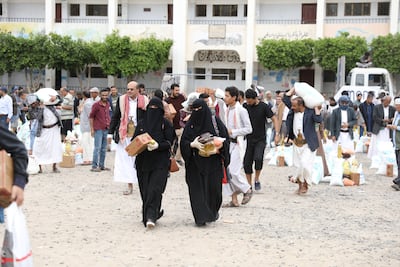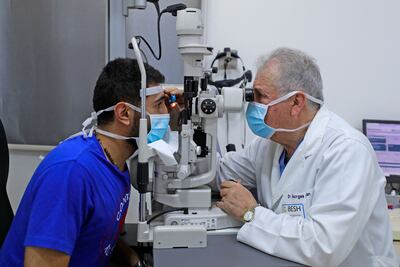Despite relatively low levels of general awareness and knowledge about its applications in the Middle East and North Africa, blockchain technology is rapidly gaining momentum. Whether the region chooses to step up its adoption depends largely on the availability of regulatory frameworks, an enabling ecosystem as well as confidence in the added value and security the technology offers.
New economic activities, cost reduction, transparency and security represent the main benefits encouraging public and private sector organisations to adopt blockchain technology. While many expect it to revolutionise numerous sectors, it is still in its "proof of concept" stage and yet to go mainstream. This is good news for a region where several countries are struck by a prolonged socio-economic impasse, whereby the advent of blockchain could mark a great opportunity to make a noticeable change.
Globally, blockchain is having an impact on major sectors with pilot projects in place to evaluate its feasibility. Nations such as the US, Canada, China, Japan and countries in Western Europe are witnessing impressive growth in blockchain investments.
In an effort to develop a global supply chain platform, enterprise software giant SAP was one of the first few to establish a blockchain consortium comprising firms such as HP, Intel, UPS and Airbus. Today, dozens of such consortiums exist globally, bringing together businesses from various sectors such as banking, transport and hospitality, among others.
Blockchain solutions have yet to expand into a full-blown implementation in the Mena region or even globally. However, our region has begun embracing the transformative technology, which promises a positive impact on local communities and economies.
Blockchain has yet to go mainstream. This is good news for a region where several countries are struck by a socio-economic impasse
The proliferation of blockchain in the region has been mainly seen in crypto, NFTs and the financial services sector. Being an early adopter, the sector is leveraging the technology in banking, remittances, securities and investments.
Vast blockchain spending is expected to focus on manufacturing, retail and professional services sectors in the years to come. IT and business services will also account for the majority of all blockchain spending this year. Other sectors such as food and health care can also benefit from the technology.
Poverty, conflict, unemployment, poor quality of education and scarcity of resources such as electricity are some of the most common socio-economic issues facing a number of countries in the Mena region today. But where there are challenges there are bound to be opportunities as well, and there is little doubt a number of sectors stand to benefit from the so-called Web3 applications.
Governments, for instance, can use blockchain for record keeping, from real estate transactions to student loan disbursements and tracking of humanitarian aid. Such use cases may reduce corruption, fraud and cost by steering away from the obscurity of typical government transactions and paper use. Port authorities around the globe, for instance, have been using the technology to develop tamper-proof methods to track shipments. The goal is to ensure payments reach the right parties, eliminating fraudulent accounts and money laundering.
Corruption is such an all-pervasive problem in several countries in the Middle East, particularly conflict-ridden ones, that, even though donors want to support humanitarian efforts, they are often hesitant to do so, fearing misuse of donations. Blockchain offers donors and philanthropies a high level of transparency about how their contributions are being distributed among beneficiaries. The technology is likely to amplify donations towards various causes, from food and medical supplies to education and infrastructure. In effect, this move could alleviate poverty and improve the quality of life in underprivileged communities.
Another form of corruption is piracy. Anti-piracy organisations and local authorities are working hand-in-glove to crack down on counterfeit music, films and other products. Purchasing songs and music using cryptocurrency could eliminate copyright infringement. As a result, an enabling environment for budding artists could emerge, allowing them to reach their audience directly without bearing the cost of distributors.
Blockchain can also serve as a global platform for patients’ medical records, eliminating the risk of hacking or deletion. A decentralised ledger of medical data may help provide the necessary insights to fight disease, while supporting the allocation of humanitarian aid in war-torn countries.
Land ownership records in our region, too, are vague and susceptible to tampering through bribery. Blockchain allows tracking of land ownership history, verifying registrations and running background checks on payments, title deeds and taxes. In fact, in more developed markets such as the UAE, real estate is being tokenised as a means of trade. Landlords can now issue blockchain-based tokens, which represent the value of their shares in certain assets. In addition, many developers and real estate agencies have started selling land and virtual properties as NFTs.
Another major challenge, particularly in countries suffering from unrest or emerging from it, has been the lack of regular power supply. But with the help of the technology, consumers can share their energy with their neighbours for a fee.
This is a useful option to have not just in unstable environments but in stable ones too, where a consumption model called the "sharing economy" is becoming increasingly popular, particularly among millennials. As the short-term lease of some products and services gradually replaces full ownership by a single person or entity, the use of blockchain can yield positive results for Mena-based businesses and individuals while tackling pollution and saving resources.
A new technology becomes infinitely more important if it can enable financial inclusion. And blockchain has proved to be handy for lenders who want to extend micro-loans to people in disadvantaged communities with no access to banking services. Street vendors, for instance, will need minimal financial support to set up food stalls. The technology allows micro entrepreneurs to borrow money without the need for the thorough credit checks currently required by banks, leading to a reduction in unemployment.
According to the World Bank, 1.7 billion people around the globe are unbanked. But for those living in remote areas or conflict zones, where banks are not present, blockchain can come in handy. The technology also facilitates faster and more cost-efficient transactions such as remittances, which many families across the region rely on to secure a decent living.
Furthermore, consumers can track their foods from farm to counter. Of particular interest to the Middle East, consumers might be able to tell whether the food is Halal-based on food source and preparation methods. They can also verify and ensure various aspects of food security and quality or the source of food contamination.
The potential benefits of the technology, therefore, are amply clear. But in order to perfect it, one needs to be patient.
When a new medicine is produced or an innovative therapy is developed, it undergoes a series of rigorous tests and approvals before being administered to patients. It may take months and even years before tangible benefits materialise. Even the most promising innovations will face obstacles throughout their pilot phase. Blockchain may have emerged nearly 15 years ago. But no different than a groundbreaking medication en route to achieving its full potential, this technology appears to be a promising panacea for a set of socio-economic issues our region is facing.
Points to remember
- Debate the issue, don't attack the person
- Build the relationship and dialogue by seeking to find common ground
- Express passion for the issue but be aware of when you're losing control or when there's anger. If there is, pause and take some time out.
- Listen actively without interrupting
- Avoid assumptions, seek understanding, ask questions
Company: Instabug
Founded: 2013
Based: Egypt, Cairo
Sector: IT
Employees: 100
Stage: Series A
Investors: Flat6Labs, Accel, Y Combinator and angel investors
BUNDESLIGA FIXTURES
Saturday, May 16 (kick-offs UAE time)
Borussia Dortmund v Schalke (4.30pm)
RB Leipzig v Freiburg (4.30pm)
Hoffenheim v Hertha Berlin (4.30pm)
Fortuna Dusseldorf v Paderborn (4.30pm)
Augsburg v Wolfsburg (4.30pm)
Eintracht Frankfurt v Borussia Monchengladbach (7.30pm)
Sunday, May 17
Cologne v Mainz (4.30pm),
Union Berlin v Bayern Munich (7pm)
Monday, May 18
Werder Bremen v Bayer Leverkusen (9.30pm)
Gulf Men's League final
Dubai Hurricanes 24-12 Abu Dhabi Harlequins
Global state-owned investor ranking by size
|
1.
|
United States
|
|
2.
|
China
|
|
3.
|
UAE
|
|
4.
|
Japan
|
|
5
|
Norway
|
|
6.
|
Canada
|
|
7.
|
Singapore
|
|
8.
|
Australia
|
|
9.
|
Saudi Arabia
|
|
10.
|
South Korea
|
Roll%20of%20Honour%2C%20men%E2%80%99s%20domestic%20rugby%20season
%3Cp%3E%3Cstrong%3EWest%20Asia%20Premiership%3C%2Fstrong%3E%0D%3Cbr%3EChampions%3A%20Dubai%20Tigers%0D%3Cbr%3ERunners%20up%3A%20Bahrain%0D%3C%2Fp%3E%0A%3Cp%3E%3Cstrong%3EUAE%20Premiership%3C%2Fstrong%3E%0D%3Cbr%3EChampions%3A%20Jebel%20Ali%20Dragons%0D%3Cbr%3ERunners%20up%3A%20Dubai%20Hurricanes%0D%3C%2Fp%3E%0A%3Cp%3E%3Cstrong%3EUAE%20Division%201%3C%2Fstrong%3E%0D%3Cbr%3EChampions%3A%20Dubai%20Sharks%0D%3Cbr%3ERunners%20up%3A%20Abu%20Dhabi%20Harlequins%20II%0D%3C%2Fp%3E%0A%3Cp%3E%3Cstrong%3EUAE%20Division%202%3C%2Fstrong%3E%0D%3Cbr%3EChampions%3A%20Dubai%20Tigers%20III%0D%3Cbr%3ERunners%20up%3A%20Dubai%20Sharks%20II%0D%3C%2Fp%3E%0A%3Cp%3E%3Cstrong%3EDubai%20Sevens%3C%2Fstrong%3E%0D%3Cbr%3EChampions%3A%20Dubai%20Tigers%0D%3Cbr%3ERunners%20up%3A%20Dubai%20Hurricanes%3C%2Fp%3E%0A
New UK refugee system
- A new “core protection” for refugees moving from permanent to a more basic, temporary protection
- Shortened leave to remain - refugees will receive 30 months instead of five years
- A longer path to settlement with no indefinite settled status until a refugee has spent 20 years in Britain
- To encourage refugees to integrate the government will encourage them to out of the core protection route wherever possible.
- Under core protection there will be no automatic right to family reunion
- Refugees will have a reduced right to public funds
ALRAWABI%20SCHOOL%20FOR%20GIRLS
%3Cp%3ECreator%3A%20Tima%20Shomali%3C%2Fp%3E%0A%3Cp%3EStarring%3A%C2%A0Tara%20Abboud%2C%C2%A0Kira%20Yaghnam%2C%20Tara%20Atalla%3C%2Fp%3E%0A%3Cp%3ERating%3A%204%2F5%3C%2Fp%3E%0A
STAR%20WARS%20JEDI%3A%20SURVIVOR
%3Cp%3E%3Cstrong%3EDeveloper%3A%3C%2Fstrong%3E%20Respawn%20Entertainment%3Cbr%3E%3Cstrong%3EPublisher%3A%3C%2Fstrong%3E%20Electronic%20Arts%3Cbr%3E%3Cstrong%3EConsoles%3A%3C%2Fstrong%3E%20PC%2C%20Playstation%205%2C%20Xbox%20Series%20X%20and%20S%3Cbr%3E%3Cstrong%3ERating%3A%3C%2Fstrong%3E%204%2F5%3C%2Fp%3E%0A
THE SPECS
Engine: 3.5-litre supercharged V6
Power: 416hp at 7,000rpm
Torque: 410Nm at 3,500rpm
Transmission: 6-speed manual
Fuel consumption: 10.2 l/100km
Price: Dh375,000
On sale: now
UAE currency: the story behind the money in your pockets
The%20specs%3A%20Taycan%20Turbo%20GT
%3Cp%3E%3Cstrong%3EEngine%3A%20%3C%2Fstrong%3EDual%20synchronous%20electric%20motors%0D%3Cbr%3E%3Cstrong%3EPower%3A%20%3C%2Fstrong%3E1%2C108hp%0D%3Cbr%3E%3Cstrong%3ETorque%3A%20%3C%2Fstrong%3E1%2C340Nm%0D%3Cbr%3E%3Cstrong%3ETransmission%3A%20%3C%2Fstrong%3ESingle-speed%20automatic%20(front%20axle)%3B%20two-speed%20transmission%20(rear%20axle)%0D%3Cbr%3E%3Cstrong%3ETouring%20range%3A%20%3C%2Fstrong%3E488-560km%0D%3Cbr%3E%3Cstrong%3EPrice%3A%20%3C%2Fstrong%3EFrom%20Dh928%2C400%0D%3Cbr%3E%3Cstrong%3EOn%20sale%3A%20%3C%2Fstrong%3EOrders%20open%3C%2Fp%3E%0A
When Umm Kulthum performed in Abu Dhabi
Known as The Lady of Arabic Song, Umm Kulthum performed in Abu Dhabi on November 28, 1971, as part of celebrations for the fifth anniversary of the accession of Sheikh Zayed bin Sultan Al Nahyan as Ruler of Abu Dhabi. A concert hall was constructed for the event on land that is now Al Nahyan Stadium, behind Al Wahda Mall. The audience were treated to many of Kulthum's most well-known songs as part of the sold-out show, including Aghadan Alqak and Enta Omri.
Specs
Engine: Duel electric motors
Power: 659hp
Torque: 1075Nm
On sale: Available for pre-order now
Price: On request
Read more about the coronavirus
Story%20behind%20the%20UAE%20flag
%3Cp%3EThe%20UAE%20flag%20was%20first%20unveiled%20on%20December%202%2C%201971%2C%20the%20day%20the%20UAE%20was%20formed.%C2%A0%3C%2Fp%3E%0A%3Cp%3EIt%20was%20designed%20by%20Abdullah%20Mohammed%20Al%20Maainah%2C%2019%2C%20an%20Emirati%20from%20Abu%20Dhabi.%C2%A0%3C%2Fp%3E%0A%3Cp%3EMr%20Al%20Maainah%20said%20in%20an%20interview%20with%20%3Cem%3EThe%20National%3C%2Fem%3E%20in%202011%20he%20chose%20the%20colours%20for%20local%20reasons.%C2%A0%3C%2Fp%3E%0A%3Cp%3EThe%20black%20represents%20the%20oil%20riches%20that%20transformed%20the%20UAE%2C%20green%20stands%20for%20fertility%20and%20the%20red%20and%20white%20colours%20were%20drawn%20from%20those%20found%20in%20existing%20emirate%20flags.%3C%2Fp%3E%0A
UAE currency: the story behind the money in your pockets
The five pillars of Islam
COMPANY%20PROFILE
%3Cp%3E%3Cstrong%3EName%3A%20%3C%2Fstrong%3ESmartCrowd%0D%3Cbr%3E%3Cstrong%3EStarted%3A%20%3C%2Fstrong%3E2018%0D%3Cbr%3E%3Cstrong%3EFounder%3A%20%3C%2Fstrong%3ESiddiq%20Farid%20and%20Musfique%20Ahmed%0D%3Cbr%3E%3Cstrong%3EBased%3A%20%3C%2Fstrong%3EDubai%0D%3Cbr%3E%3Cstrong%3ESector%3A%20%3C%2Fstrong%3EFinTech%20%2F%20PropTech%0D%3Cbr%3E%3Cstrong%3EInitial%20investment%3A%20%3C%2Fstrong%3E%24650%2C000%0D%3Cbr%3E%3Cstrong%3ECurrent%20number%20of%20staff%3A%3C%2Fstrong%3E%2035%0D%3Cbr%3E%3Cstrong%3EInvestment%20stage%3A%20%3C%2Fstrong%3ESeries%20A%0D%3Cbr%3E%3Cstrong%3EInvestors%3A%20%3C%2Fstrong%3EVarious%20institutional%20investors%20and%20notable%20angel%20investors%20(500%20MENA%2C%20Shurooq%2C%20Mada%2C%20Seedstar%2C%20Tricap)%3C%2Fp%3E%0A
Jetour T1 specs
Engine: 2-litre turbocharged
Power: 254hp
Torque: 390Nm
Price: From Dh126,000
Available: Now
FIGHT%20CARD
%3Cp%3EAnthony%20Joshua%20v%20Otto%20Wallin%2C%2012%20rounds%2C%20heavyweight%3C%2Fp%3E%0A%3Cp%3EDeontay%20Wilder%20v%20Joseph%20Parker%2C%2012%20rounds%2C%20heavyweight%3C%2Fp%3E%0A%3Cp%3EDmitry%20Bivol%20v%20Lyndon%20Arthur%2C%2012%20rounds%2C%20light%20heavyweight%3C%2Fp%3E%0A%3Cp%3EDaniel%20Dubois%20v%20Jarrell%20Miller%2C%2012%20rounds%2C%20heavyweight%3C%2Fp%3E%0A%3Cp%3EFilip%20Hrgovic%20v%20Mark%20de%20Mori%2C%2012%20rounds%2C%20heavyweight%C2%A0%3C%2Fp%3E%0A%3Cp%3EArslanbek%20Makhmudov%20v%20Agit%20Kabayel%2C%2012%20rounds%2C%20heavyweight%C2%A0%3C%2Fp%3E%0A%3Cp%3EFrank%20Sanchez%20v%20Junior%20Fa%2C%2012%20rounds%2C%20heavyweight%C2%A0%3C%2Fp%3E%0A%3Cp%3EJai%20Opetaia%20v%20Ellis%20Zorro%2C%2012%20rounds%2C%20cruiserweight%3C%2Fp%3E%0A
Who has lived at The Bishops Avenue?
- George Sainsbury of the supermarket dynasty, sugar magnate William Park Lyle and actress Dame Gracie Fields were residents in the 1930s when the street was only known as ‘Millionaires’ Row’.
- Then came the international super rich, including the last king of Greece, Constantine II, the Sultan of Brunei and Indian steel magnate Lakshmi Mittal who was at one point ranked the third richest person in the world.
- Turkish tycoon Halis Torprak sold his mansion for £50m in 2008 after spending just two days there. The House of Saud sold 10 properties on the road in 2013 for almost £80m.
- Other residents have included Iraqi businessman Nemir Kirdar, singer Ariana Grande, holiday camp impresario Sir Billy Butlin, businessman Asil Nadir, Paul McCartney’s former wife Heather Mills.
Hunting park to luxury living
- Land was originally the Bishop of London's hunting park, hence the name
- The road was laid out in the mid 19th Century, meandering through woodland and farmland
- Its earliest houses at the turn of the 20th Century were substantial detached properties with extensive grounds



